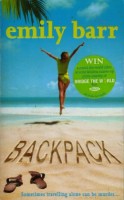Emīlijas Barras grāmata “Backpack”
Laiku starp saviem ceļojumiem mēs cenšamies aizpildīt ar aktivitātēm, kas lielākā vai mazākā mērā ar ceļošanu ir saistītas. Piemēram, lasām par to grāmatas. Tas palīdz vieglāk tikt galā ar ikdienu un neļauj apslāpt ceļošanas kārei. Turklāt lasīt grāmatas ir vērtīgi – kā saka, you should be ashamed if the only book you open is Facebook.
Autors: Diāna
Diemžēl arī šoziem neizdevās izsprukt no mūsu klimatam raksturīgās parādības – saslimšanas. Angīna gandrīz vienmēr paraksta spriedumu pavadīt mājas režīmā vismaz nedēļu. Patīkami tas nav, tomēr pēkšņi parādās ļoti daudz brīvā laika, ko var veltīt grāmatu lasīšanai.
 Tā nu es pāris dienās pieveicu grāmatu, kas mūsu plauktā savu kārtu gaidīja jau veselus trīs gadus – Emīlijas Barras “Backpack” mēs nopirkām lietoto grāmatu veikalā Tau salas (Koh Tao) pludmalē Taizemē.
Tā nu es pāris dienās pieveicu grāmatu, kas mūsu plauktā savu kārtu gaidīja jau veselus trīs gadus – Emīlijas Barras “Backpack” mēs nopirkām lietoto grāmatu veikalā Tau salas (Koh Tao) pludmalē Taizemē.
Arī pati grāmata ir par ceļošanu tieši Dienvidaustrumāzijā, kas tradicionāli tiek uzskatīta par mugursomnieku paradīzi, tomēr galvenā varone Tansija turp nokļūst gandrīz nejauši. Pēc savas mātes bērēm viņa iecerējusi doties smalkā atpūtas braucienā uz Taizemes kūrortiem, bet attopas Vjetnamā, viena pati un ar mugursomu plecos, lai gan pieskaitīt sevi mugursomniekiem ir pēdējais, ko Tansija vēlas, jo viņai patiesi riebj šis apzīmējums.
Grāmatā ir pa druskai no visa – ceļojuma apraksti, deva romantikas un humora un pat krimināls pavediens. Kritiķi autorei, kas nu jau sarakstījusi deviņas grāmatas ar ceļošanas motīviem, ne reti pārmet vāji izstrādātus varoņu tēlus, tomēr šajā grāmatā, vismaz tās ievadā, galvenā varone tiek attēlota pietiekami prasmīgi, lai izraisītu ļoti lielas antipātijas. (Ceļojums, protams, Tansiju maina uz labo pusi.)
Jā, šai lasāmvielai ir zināma lubenes piegarša, tomēr “Backpack” joprojām tiek uzskatīta par Barras labāko darbu, un man šķiet, ka pelnīti, jo galu galā grāmata lasās viegli, ir gana izklaidējoša un arī stāsta norises vietas – Vjetnama, Laosa, Taizeme, Ķīna un Nepāla – aprakstītas gana spilgti un trāpīgi. Ja šī grāmata kādreiz nonāk jūsu rokās, noteikti izlasiet to kaut vai šo iemeslu dēļ.
Zemāk daži vērtīgi citāti.
Varbūt arī jūs zināt kādas labas grāmatas par ceļošanu? Priecāsimies par ieteikumiem!
“Backpacker” by Emily Barr:
They might seize the opportunity and lose me, too polite to tell me they don’t want to travel with me any more. In which case I’m no further on than I was when I started. Maybe this is what travelling’s all about: starting afresh, over and over again. It is an exhausting thought. I think that people who spend ages on the road must be people who are scared to have proper friendships, who are too insecure to put down roots, but who want to reinvent themselves, safe with strangers, year after year after year. (p.80)
Every day I feel more certain that I can survive this accidental travelling experience. Enjoying it is a different matter, of course, but I think I can get through it. (p.82)
He looks confused.
‘Sorry, mate, I thought you said you were away for a year? Are you just on holiday?’
‘No. But I’m not a backpacker.’
‘How come?’
‘I really hate the word. I hate the word backpack – it’s a rucksack, that’s its name. And apart from that, why do I have to be labelled by the kind of bag I’ve got? When I’ve been away before, no one’s tried to call me a suitcaser. I haven’t been suitcasing. I’m not a handbagger when I’m in London.’ (p.100)
Some passing teenagers point us out, and stare. I’m glad to be conspicuous again, to be somewhere remote. I’m glad that this place is not overrun by westerners. And I am disturbed by the whole phenomenon of ‘backpacking’. It can, quite clearly, irrevocably alter a country and yet it carries with it the aura of being somehow different from and better than mainstream tourism. It is, I realise, no better at all. A major difference between backpacking and normal tourism is the fact that backpackers go out of their way to spend as little money as possible. Once a place, like Vang Vieng, becomes ‘known’, then people flock there like sheep. It scares me a little. I am part of the phenomenon. It feels like intense exploitation of people who have to welcome us, because they need the money. We’ve seen only a couple of other white faces in this town and that can only be good. (p.166)
But I hate it when people come and take over a place and prance around thinking their kind of tourism is better than any other kind. Because it’s not. ‘That’s arguable,’ he says, as we come out of the cave and back into the scorching sun. ‘But I think you should try some less explored places. Yoga in an ashram’ll probably be perfect for your friend, but there’s a massive industry catering for westerners in crisis in India. Less obvious places are much more interesting. When you don’t find English spoken everywhere, and things aren’t set up for your convenience. You struggle, and you manage, and it all works out in a way you never dreamed of. You never have the trip you expected to have.’ (p.170)
‘You never dreamed of this, did you? You had your trip defined entirely in terms of what you were leaving behind.’
‘How do you know that?’
‘Because I did, too. You know exactly what you’re leaving behind, but you can’t really picture what you’re going towards.’ (p.172)



